Project Home Fire Brief Shot: The Abortion DivideBrief Shots are quick, newsworthy notes from the UVA Center for Politics/Project Home Fire polling and data analytics project. On Monday, President Joe Biden’s administration asked the U.S. Supreme Court to block a Texas law that imposes strict limits on abortion. The Supreme Court has agreed to consider fast track appeal of the case. With that as background, we looked at abortion opinions by voters who supported Joe Biden and those who supported Donald Trump in the 2020 presidential election. What we found is that a strong indicator of a voter’s position on abortion is who they voted for in 2020. Biden voters are 3 times more likely than Trump voters to support keeping abortion legal in most situations. And they are significantly more concerned than Trump voters with preventing women from losing access to safe and legal abortion services. The very different opinions these two groups of voters have on immigration, abortion, and so much more highlight the challenge for those who wish to encourage bridge-building and constructive dialogue and re-affirm America’s reputation as the world’s leading representative democracy. But as this release shows — see below — there is hope for compromise. Figure 1: Abortion opinions, Biden vs. Trump voters
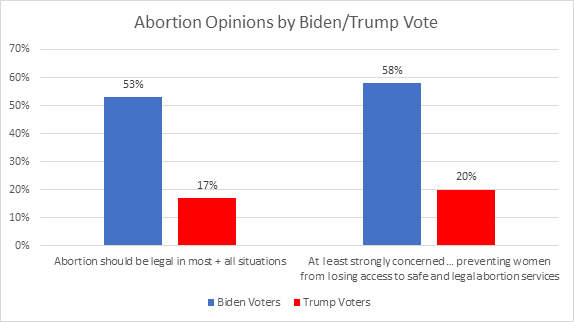 For more on Project Home Fire, join us Thursday, Nov. 4 at 6:30 p.m. for our annual American Democracy Conference. The virtual event will begin with a presentation by Project Home Fire’s Larry Schack and Mick McWilliams on our ongoing polling and data analytics project. They will be followed by a panel discussing the state of politics moderated by Carah Whaley, Assistant Director of the James Madison Center for Civic Engagement, and featuring UVA Center for Politics resident scholars David Ramadan and Tara Setmayer; former Rep. Barbara Comstock (R, VA-10); author and journalist Sophia Nelson; and Crystal Ball Managing Editor Kyle Kondik. The free, virtual event will be available at this link: https://livestream.com/tavco/uvacfp-adc2021 |
KEY POINTS FROM THIS ARTICLE
— Voters who supported Joe Biden are likelier to be among the strongest supporters of compromise than Donald Trump voters, and there also are markedly more women in this group than men. These voters prioritize taking proactive steps to address concerns they have about the nation.
— Trump voters are also likelier to be among those least open to compromise, and there are slightly more men among this group than women. These voters see compromise as contrary to their interests.
— Those most open to compromise are less likely to believe the worst about the other side and more likely to believe Joe Biden legitimately won the 2020 election.
— A mix of both Biden and Trump voters are open to some kind of compromise, either among Americans as a whole or among members of Congress.
Identifying those most open to political compromise
Those who voted for Joe Biden appear to be more open to compromise than those who voted for Donald Trump.
That is one key takeaway from the latest analysis of our ongoing University of Virginia Center for Politics/Project Home Fire polling and data analytics project.
After looking at the divides in American life, including support for secession among a significant share of those who voted for Donald Trump and Joe Biden, and analyzing immigration attitudes as a key dividing line between the two camps, we wanted to highlight the kinds of people who are most receptive to compromise, based on our analysis of a survey project we conducted in late July and early August.
In our assessment of which Americans are more open to compromise, we created five categories, ranging from the most committed to compromise (“Committed Compromisers”) to those least committed to compromise (“Conflict Hard Cores”).
The committed compromisers group is made up of two-thirds Biden voters (66%) and just one-third (34%) Trump voters (see Table 1 below). Those in this group favor both Americans and their congressional representatives working together to find common ground and solve our nation’s critical challenges. They see ongoing conflict as a harbinger of bad things to come and disagree with the idea of a national divorce.
Meanwhile, about 3 in 5 (61%) of “Conflict Hard Cores” are Trump voters, while about 2 in 5 are Biden (39%) voters. They believe the other side has become too extreme for compromise and that their party’s congressional representatives should resist compromising with the other side. They reject the idea of prioritizing compromise over conflict, and the level of fear and distrust of the other side among this group is high. They see compromise as contrary to their interests, and present as seeing the benefits of their own interests as superior to the benefits of what compromise can offer (see Tables 2 and 3 below).
There are markedly more women (62%) than men (38%) in the compromise-favoring former group, while there are slightly more men (53%) than women (47%) in the compromise-averse latter group (see Table 4 below).
What follows is an explanation of how we came to these findings, and what they might mean for incentivizing compromise between Trump and Biden voters.
Finding and prioritizing common ground
To better understand Biden and Trump voters and their openness to compromise, we created a “compromise receptivity” score through a simple average of two questions’ responses: belief that Americans need to compromise versus a belief that the other side has become too extreme for compromise, as well as a belief that the respondent’s party’s congressional representatives should compromise with the other party versus a belief that they should resist compromise.
This analysis revealed that a surprisingly large amount of Biden and Trump voters (28%) — or more than 43 million Americans who voted in the 2020 presidential election as extrapolated from the results of this survey — self-select as “double receptives,” or what we call “Committed Compromisers.” That is, they strongly agree that “Americans must prioritize compromise over conflict to overcome our political divisions and address our nation’s critical challenges” and that “Republicans/Democrats in Congress should work to achieve compromise with the congressional Democrats/Republicans in solving America’s problems.”
On the other hand, we found 23% of Biden and Trump voters — more than 36 million Americans who voted in the 2020 presidential election, extrapolated from the survey — self-select as “double rejectors,” or what we call “Conflict Hard Cores.” That is, they believe both that “Americans on the political right/left have become so extreme in what they want America to become that there is no longer room to compromise with them” and that “Republicans/Democrats in Congress should resist compromising with the congressional Democrats/Republicans and seek solutions to America’s problems on their own.”
There are also swing groups that identify with favoring one pathway of compromise, but not both — 11% that favor compromise between people, but not in Congress, and 20% that favor compromise in Congress, but not between people. Further, 18% present as conflict or compromise ambivalent; that is, they average middling scores on both measures of compromise willingness.
Table 1: Biden/Trump voter compromise receptivity scores
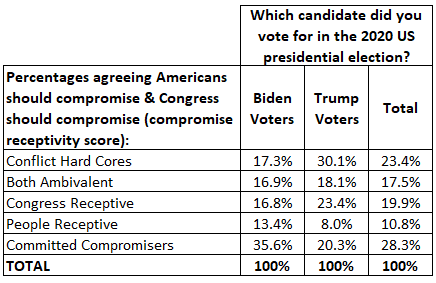
To better understand what most strongly predicts Biden and Trump voter compromise receptivity, we ran an analysis across almost 290 different variables. Focusing on the Conflict Hard Cores and the Committed Compromisers — those most inclined to block compromise or accelerate compromise, respectively — we find that those who reject compromise are motivated by a “fear of the other” mindset that manifests itself as hostility towards people on the other side, while those who prioritize compromise are disillusioned with what is happening because of the polarization and conflict that dominates our politics today.
Conflict Hard Cores do not see how compromise translates into benefits for them: This group overlaps significantly with those voters who are opposed to starting a dialogue on immigration, as well as those who are supportive of secession. More than 8 in 10 of these voters express some form of distrust for voters they associate with the other side, see elected officials from the opposite party as presenting a clear and present danger to American democracy, and believe they will experience personal loss or suffering due to the policies of the other side.
Not surprisingly, these Biden and Trump voters are consistently less inclined towards compromise receptivity. Perhaps surprisingly, both Biden and Trump Conflict Hard Core voters are likely to agree equally with these statements.
Table 2: Conflict Hard Cores/Committed Compromisers fear of the other statements
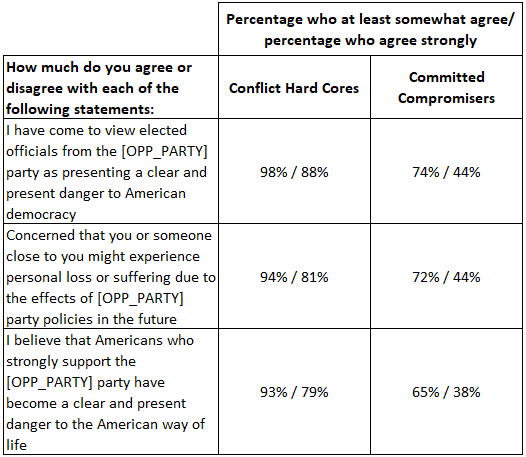
Note: For the statements listed in Table 1, respondents were asked how much they agreed or disagreed with the statement on a 0-100 point scale (0 was categorized as disagreeing completely, 1-25 means strongly disagreeing, 26-50 was disagreeing somewhat, 51-75 was agreeing somewhat, 76-99 was strongly agreeing, and 100 was agreeing completely). So, the percentage of people who at least somewhat agreed with the statement selected 51 or above on the scale for the given statement, and the percentage of those who at least strongly agreed selected 76 or above.
Committed Compromisers see compromise as a path forward. This group overlaps more with those voters open to a conversation about immigration that balances their interests with those of immigrants, and they are more likely to disagree with the idea of a national divorce. Those who prioritize compromise say they have spent a lot of time viewing video footage of the events that took place at the United States Capitol on Jan. 6, 2021, suggesting they are critical of those events. They reject the idea that the election was stolen from Donald Trump. Further, these voters set up as motivated by anxiety about what is happening in society and favor taking proactive steps to address systemic concerns they have — from addressing systemic racism in America to expanding access to voting in elections to investing in clean energy to help reduce carbon emission and combat climate change.
Table 3: Conflict Hard Cores/Committed Compromisers fear of what’s happening statements
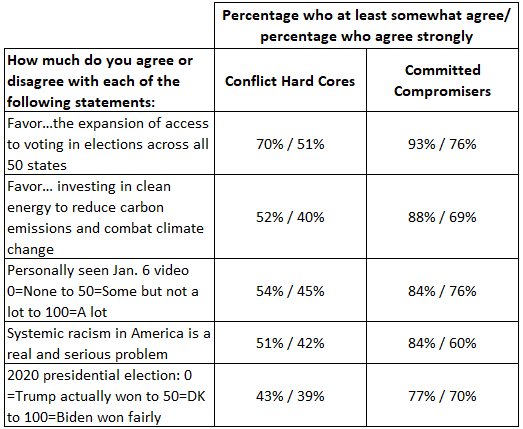
Note: The same 0-100 point scale described in the note under Table 2 is also used here.
Significantly, looking across both these groups it is women who are both less unwilling and more willing to favor compromise over conflict than men. Amongst the Conflict Hard Cores 53% are men, while 47% are women. Looking at the Committed Compromisers, 62% are women vs. 38% men. So, to a greater extent than women, men present as compromise blockers who are motivated by a fear of the other side and who are likelier to evince a winner take most attitude that prioritizes polarization, radicalization, and conflict. On the other hand, women are likelier than men to more strongly present as compromise accelerators who elevate comity and community over anger and alienation. Those in the Committed Compromisers group are likelier to want to take steps to address racism, expand voting rights, and protect the environment. These issues are powerful in predicting compromise receptivity. They speak to the concerns women have about what is happening in society and what it means for them and others. They rise to the goal of elevating an “others focus” that is consistent with their leanings towards compromise over conflict.
Table 4: Conflict Hard Cores/Committed Compromisers by gender
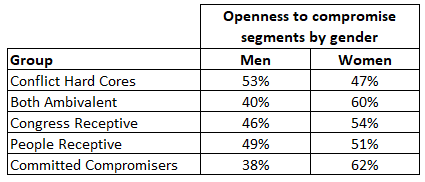
From conflict to compromise
Looking across the UVA Center for Politics and Project Home Fire releases to date, we see mounting evidence that the level of distrust that exists in our nation right now is unprecedented in recent history. It poses a real threat to the future of our democracy and our ability to address domestic and international challenges. Left unchecked we risk waiting until it is too late to find our way back.
We know there is a better way forward: We believe there are pathways for engaging people and moving them to action; bringing people together and moving forward based on our shared values and our long history together; challenging the jaded view that conflict is the only way forward; and building consensus and creating new solutions grounded in the motivations of compromise receptive Biden and Trump voters.
In the coming weeks we will be building on our understanding of this Committed Compromiser group and the role they might play as a “bridging population” — a collection of Biden and Trump voters who present as compromise receptive and are, in significant ways, less dissimilar from each other than they realize. This analysis will take a deeper look into these compromise receptive Biden and Trump voters. It will group them based on their motivations as gleaned through their responses to key questions. It will identify further who they are, how to reach them, and ways we can better connect with and engage them to support the bigger goal of healing and repairing our democracy. And we will support this effort with ongoing work focused on the roughly 50% of Biden and Trump voters who present as falling somewhere between compromise receptive and compromise resistant to make gains on moving some towards compromise receptivity and to prevent others from sliding into conflict.
About the poll
From July 22 to Aug. 4, 2021, Project Home Fire worked with InnovateMR, an industry-leading top 20 marketing research data collection firm, to capture online responses to more than 300 questions spanning social, political, and psychological topics from 1,001 Donald Trump presidential election voters and 1,011 Joe Biden voters (N=2,012), with a margin of error of +/- 2.2 percentage points.
| Drs. Robert “Mick” McWilliams and Larry Schack are co-founders of Project Home Fire (www.projecthomefire.com), a new initiative dedicated to finding common ground in American politics that is working with the UVA Center for Politics to explore and address the political, social, and psychological divides in the American electorate. They also are co-founders with Jerry Howard of Predictive Branding Partners (www.predictivebrandingpartners.com), the only brand strategy practice that is predictive of customer behavior. Deeply passionate about finding solutions to the precarious state of American Democracy, Mick and Larry are uniquely positioned to translate the proven Predictive BrandingTM approach to one of the most pressing issues of our time, by bringing a fresh and non-partisan perspective grounded in cutting-edge predictive analytics and real-world insight. |
